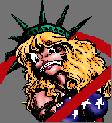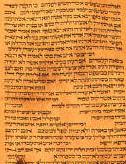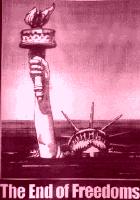 |
|
| |
Even with the censoring, much of the hate speech remained
in the Talmud, as it does today. A few examples of this hate speech might be instructive.
In the Sota tractate, a Christian church is called "Beth Tiflah," which translates
to mean either a house of foolishness or a brothel. In "Midrasch Talpioth it says
that Christians were created for the sole end of ministering to Jews day and night,
and that non-Jews are animals in human form. The examples of this intolerant language
abound in the Talmud. If you doubt it, you can read it for yourself, because unlike
some Jewish groups today which are pressuring governments, Internet providers,
publishers and others to censor non-Jewish free expression, there are no organized
non-Jewish groups pressuring governments, Internet providers, publishers and others
to censor Jewish free expression.  According
to THE ESSENTIAL TALMUD, by Adin Steinsaltz "[T]almudic study has been prohibited
[at times] because it was abundantly clear that a Jewish society that ceased to
study this work had no real hope of survival." Thus, by destroying the Talmud,
one could also destroy the Jews. In essence, Steinsaltz is simply saying what
most thinking people know: words and symbols are important to the survival of
a distinct people. Remove their words and symbols and you can destroy a people.
This is so, because all humans are dependent on words and symbols in their thinking
processes. Keep them from being able to read and express themselves and you destroy
them as a people. To repress their free speech rights is to repress them as a
people. I belabor this point, because, this is precisely what is being done to
non-Jews today, and ironically those who are now the censors and the ones who
are trying to destroy non-Jewish philosophical, religious, political and social
thought are primarily some Jews. You'd think that those Jews who are trying to
censor free speech of non-Jews would have learned something from history, but
apparently they didn't. According
to THE ESSENTIAL TALMUD, by Adin Steinsaltz "[T]almudic study has been prohibited
[at times] because it was abundantly clear that a Jewish society that ceased to
study this work had no real hope of survival." Thus, by destroying the Talmud,
one could also destroy the Jews. In essence, Steinsaltz is simply saying what
most thinking people know: words and symbols are important to the survival of
a distinct people. Remove their words and symbols and you can destroy a people.
This is so, because all humans are dependent on words and symbols in their thinking
processes. Keep them from being able to read and express themselves and you destroy
them as a people. To repress their free speech rights is to repress them as a
people. I belabor this point, because, this is precisely what is being done to
non-Jews today, and ironically those who are now the censors and the ones who
are trying to destroy non-Jewish philosophical, religious, political and social
thought are primarily some Jews. You'd think that those Jews who are trying to
censor free speech of non-Jews would have learned something from history, but
apparently they didn't. |
Under pressure from Jewish groups, the French government
is now trying to stop Yahoo! from allowing online auctions that sell Nazi paraphernalia,
even though Yahoo! is located in the U.S.  Also
under pressure from Jewish groups, the German government arrests German citizens
if they raise their arms the wrong way or if they possess certain books or symbols. Also
under pressure from Jewish groups, the German government arrests German citizens
if they raise their arms the wrong way or if they possess certain books or symbols.
In the U.S., the Simon Wiesenthal Center in Los Angeles sells a CD called "Digital Hate 2001," in which almost 3,000 Web sites are listed as "problematic." About the only thing that most of these Web sites have in common is that they're mostly run by non-Jews and have said or written things that some Jews don't like. Some of these Web sites are run by mainline conservative political groups. Also, in the U.S. The ADL of B'nai B'rith has formed a partnership with AOL to keep sites that the ADL doesn't like off the Internet. In all of the above examples, starting with the repression of the Talmud, right up to the latest repression of thoughts made manifest as words, that some are afraid to let others read, we see the same type of basic fear of freedom and free speech. In addition, we see attempts to destroy distinct peoples by attacking the products of their minds and the symbols and words that help give them a sense of identity. |
| In all of the above examples, noble sounding rationales
were put forth for the destruction of the free expression of ideas. The Catholic
Church had such rationales and pointed to the anti-Christian writings in the Talmud
as their justification. Today, various Jewish groups point to what they claim
are anti-Semitic or hate writings on the Internet. |
 How
should we look at free expression so that we're not manipulated and tricked into
censoring religious, political, social or philosophical thought based on what
might sound like a good reason to so censor such thought? Simple. We should take
a "content neutral" view of all free expression, that does not advocate immediate
violence. In other words, when we're faced with any type of expression, we should
not presume to look at the writing through our own biased eyes and determine that
whatever it is we're reading or seeing isn't fit for others to read. We should,
instead, substitute terms to see if what some are trying to censor is really what
should be protected speech or expression. We as individuals or as members of various
interest groups of like individuals--including religions--have no right to tell
other individuals or members of of other interest groups of like individuals what
they may think, say, write, read or see. We are not Gods. We have no such power
over other human beings, and if we try to assert such power, we have dehumanized
others and made them our inferiors---indeed, we have made them little more than
our slaves, who must do what we think is right. How
should we look at free expression so that we're not manipulated and tricked into
censoring religious, political, social or philosophical thought based on what
might sound like a good reason to so censor such thought? Simple. We should take
a "content neutral" view of all free expression, that does not advocate immediate
violence. In other words, when we're faced with any type of expression, we should
not presume to look at the writing through our own biased eyes and determine that
whatever it is we're reading or seeing isn't fit for others to read. We should,
instead, substitute terms to see if what some are trying to censor is really what
should be protected speech or expression. We as individuals or as members of various
interest groups of like individuals--including religions--have no right to tell
other individuals or members of of other interest groups of like individuals what
they may think, say, write, read or see. We are not Gods. We have no such power
over other human beings, and if we try to assert such power, we have dehumanized
others and made them our inferiors---indeed, we have made them little more than
our slaves, who must do what we think is right. |
|
For example, if we were to read that someone wanted to pass
a law to stop students from wearing a Star of David to school, we should ask if
the law also covers Christian crosses. If it doesn't, then the law isn't fair,
since it's only aimed at one symbol and one group who believe the symbol can be
worn. Okay, so we can probably all agree that this example makes the principle
clear. But, wait a minute. Change the terms a little more and say that someone
wants to pass a law banning a Swastika. The principle should be the same. If the
Swastika is banned, then so too should the Star of David and the Christian cross
be banned. If one is allowed, then all should be allowed. That's what "content
neutral" demands. |
 Wisdom
dictates that we do all in our power to protect the free expression of ideas in
books and on the Internet. Why should we fear any ideas and try to keep people
from expressing or reading them? If we don't agree with what some other people
think and write, then let us simply write our own views on these subjects and
let those who read them, decide which ideas they agree with. Let us determine
to be a good and a just people, and let us express our views honestly and with
forthrightness, and let us have our ideas do battle with contrary ideas for the
minds and hearts of men. Let the best ideas win. Wisdom
dictates that we do all in our power to protect the free expression of ideas in
books and on the Internet. Why should we fear any ideas and try to keep people
from expressing or reading them? If we don't agree with what some other people
think and write, then let us simply write our own views on these subjects and
let those who read them, decide which ideas they agree with. Let us determine
to be a good and a just people, and let us express our views honestly and with
forthrightness, and let us have our ideas do battle with contrary ideas for the
minds and hearts of men. Let the best ideas win.Let us set our minds and our hearts on fighting for freedom; not in trying to repress the freedoms of others. Let us say: Never again...will we allow our free speech rights to be curtailed by those who are different from us in philosophy or religion or world-view or race or ethnicity or nationality. # # # |